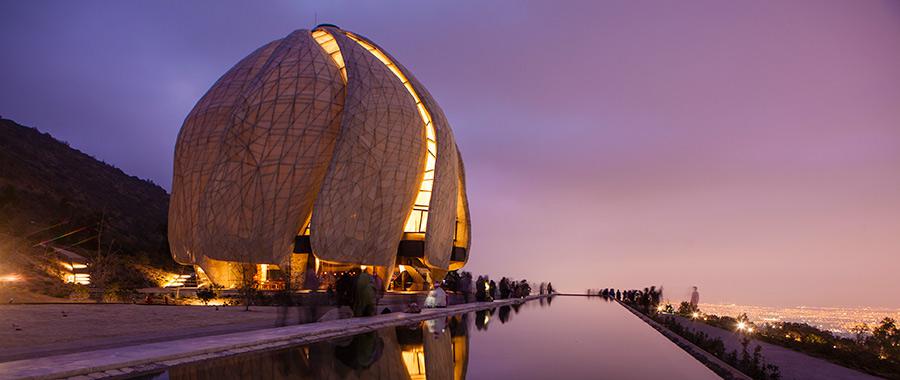The essence of creativity and spirituality converges within the walls of Bahá’í Houses of Worship, wherein sacred music plays an instrumental role in transcending the mundane and elevating the soul. These architectural marvels not only serve as places of worship but also as sanctuaries where individuals from diverse backgrounds unite in harmony and reverence. The rich traditions of sacred music found in these houses resonate with profound theological and cultural significance.
One can expect to encounter an array of musical forms within Bahá’í Houses of Worship. These encompass classical, choral, and contemporary styles, each infused with a sense of spirituality that aims to uplift congregants and evoke profound emotions. The importance of music in Bahá’í worship lies in its ability to create an atmosphere conducive to reflection, meditation, and unity.
As one enters these sacred spaces, the auditory experience begins with the echo of melodies steeped in cultural heritage. Traditional instruments may be utilized, blending principles from various musical traditions to encapsulate the universality espoused by the Bahá’í Faith. The inclusion of elements from different cultural music traditions reflects the Bahá’í ideal of inclusivity. This fusion represents the idea that, despite cultural differences, humanity’s spiritual essence remains unified and interlinked.
In a typical service, congregational singing forms a fundamental component of worship. The melodies, carefully selected, enable the community to participate actively in the spiritual experience. Such communal singing fosters a sense of togetherness, reminding attendees that they are part of a greater whole. The simplicity or complexity of the songs serves to engage congregants, leading them to explore deeper meanings in the lyrical content while encouraging emotional catharsis.
Moreover, the selection of music often includes hymns and spiritual readings. These readings are interspersed with gentle instrumentals, providing moments of reflection. This interplay between spoken word and melodic expression allows congregants to absorb profound theological insights into the teachings of Bahá’u’lláh. Music, therefore, becomes a vehicle for delivering spiritual wisdom, turning abstract religious concepts into tangible experiences.
The architecture of Bahá’í Houses of Worship is designed to enhance the acoustic experience. The spacious interiors, marked by grand domes and intricately designed spaces, facilitate the natural propagation of sound, allowing melodies to resonate throughout, creating a transcendent atmosphere. The interplay of light and sound reinforces the spiritual ambiance, inviting all who enter to embark on an inward journey of contemplation and connection with the divine.
A significant aspect of the Bahá’í teachings on music is its role in building community. Participation in musical endeavors, whether through singing in choirs or playing instruments, fosters fellowship among congregants. This collaborative spirit is emblematic of the Bahá’í ideals of unity and collective progress. Oftentimes, special musical events are organized, highlighting local talents while promoting cultural exchange, thereby strengthening bonds within and beyond the Bahá’í community.
Within the music, there are often themes of love, unity, and the sanctity of creation—tenets that resonate deeply within the Bahá’í Faith. These cultural expressions are more than just artistic pursuits; they embody the spiritual truths central to Bahá’u’lláh’s teachings. The lyrics tend to reflect moral and ethical guidance, instilling hope and a sense of purpose among attendees. For example, songs emphasizing love for humanity can inspire individuals to enact social change, which is a core principle of the Bahá’í Faith.
A rich tradition of sacred music allows for the blending of global influences while adhering to intrinsic Bahá’í values. Music from different cultures, infused with spiritual significance, enhances the global outlook of Bahá’í teachings. This respective embrace of diverse musical forms helps the community to appreciate and acknowledge the varied expressions of humanity’s shared search for connection with the divine.
Furthermore, the aesthetic aspects of sacred music contribute to an ethereal experience. As congregants listen to compositions performed by skilled musicians or choirs, they are enveloped in a soundscape that encourages spiritual upliftment. Whether it is the soft, dulcet tones of a soloist or the resounding harmonies of a collective choir, the music often invokes a sense of the numinous, which can lead to revelations about one’s spiritual journey.
The significance of music in the Bahá’í tradition extends beyond the walls of worship. The teachings emphasize the role of music in personal spiritual development. There exists a profound understanding that music can aid in the individual’s journey toward self-realization and spiritual enlightenment. Engaging with sacred music encourages personal reflection and opens avenues for deepening one’s connection to the teachings of Bahá’u’lláh.
The Bahá’í perspective recognizes that music can be a means of fostering well-being and emotional resilience. Whether through participation in communal singing or introspective listening, the therapeutic qualities of music are both acknowledged and celebrated within this faith community. Music thus serves as a powerful catalyst for personal transformation and healing, ultimately aligning with the overarching goal of spiritual elevation.
In conclusion, the role of sacred music in the Bahá’í Houses of Worship transcends mere aesthetic experience; it embodies theological significance that enhances communal and personal spiritual practice. Music remains a potent medium through which the Bahá’í teachings are expressed, encouraging unity, fostering community bonds, and promoting individual growth. These sacred spaces, reverberating with a kaleidoscope of sounds, exemplify a commitment to spiritual inclusivity and the transcendental truths that underpin the human experience.
